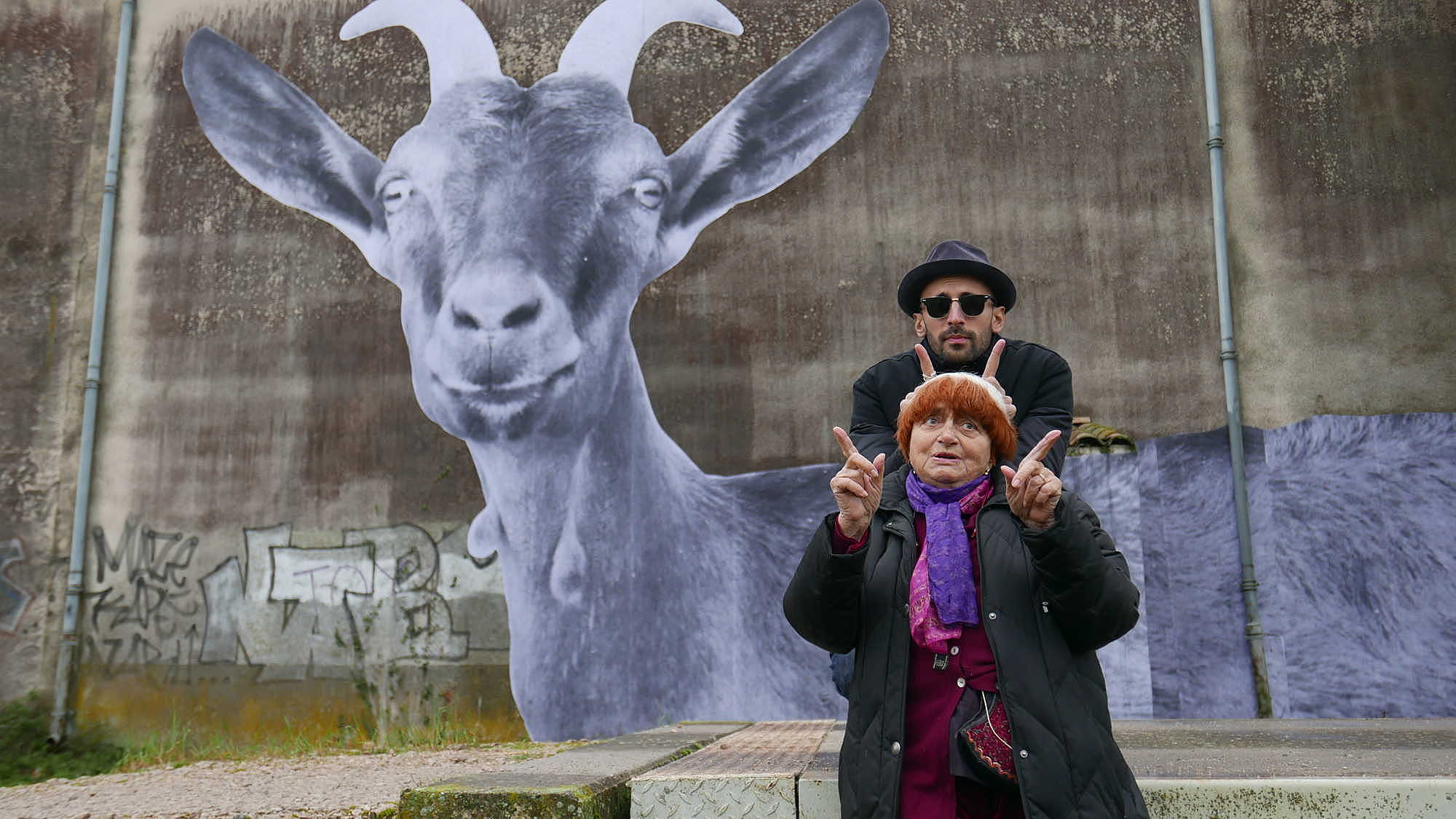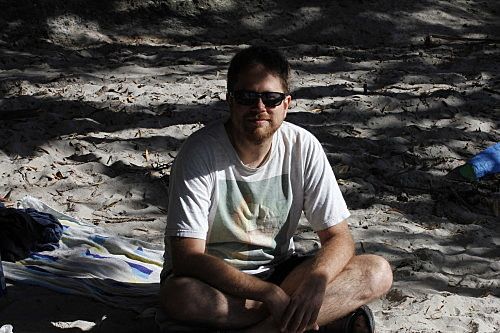Old, plump, talkative: Considering Agnès Varda
The Pantograph Punch is delighted to present Faces, Places as part of the 2017 New Zealand International Film Festival. Ahead of the films debut Doug Dillaman considers the illustrious Agnès Varda, the woman behind it all.
The Pantograph Punch is delighted to present Faces, Places as part of the 2017 New Zealand International Film Festival. Ahead of the films debut Doug Dillaman considers the illustrious Agnès Varda, the woman behind it all.
For some people, the most inspirational woman they’ll see on screen this year is Gal Gadot in Wonder Woman. For me, it will be her polar opposite: “Old, plump, talkative.” This is how Agnès Varda, the octogenarian Mother of the French New Wave describes herself at the start of The Beaches of Agnès, her 2008 documentary that summarises her life’s work and personal history through her love of beaches (intercut with virtually all of her filmography - “fifteen long features, fifteen long documentaries, not very much”). Even drawing a line between features and documentaries is hazy - Beaches is rife with re-creations and fantasias, and shows that her dramas are often drawn from both autobiography and the lives of non-professional actors. Lest this all sound a bit too chin-scratchy for your tastes, bear in mind that Varda is also the woman who dressed as a potato for a gallery premiere, and celebrated a recent New York show by rolling a giant beach ball through Manhattan streets. Now, she’s back to film for what may be her swan song: Faces Places, co-directed with young street artist JR, in which the two of them travel to villages across France.
Agnes Varda rolling a gigantic beachball down Spring Street. Guaranteed to brighten your day! pic.twitter.com/38RoIKdJ8Z
— TanyaGoldman (@tangoldman) March 15, 2017
By many conventional standards, Varda is a slippery figure to pin down, critically speaking. It’s not just that her filmography is split in both number and acclaim between fiction and non-fiction. She’s worked with star-studded international casts (One Hundred and One Nights, a flop) and homeless people (The Gleaners and I, a smash). She’s traveled not just France, but the world - America (subjects including hippies, Mexican street murals, and distant relatives), Iran (Plaisir d’Amour en Iran), and even an animated short film made from photographs she shot in Cuba (Salut les Cubains). Initially trained as a photographer, she traveled to China by herself after the financial failure of her debut film, 1956’s La Pointe-Courte (filmed four years before the box office success of Jean-Luc Godard’s Breathless officially kicked off the French New Wave), and spent two months photographing civilians. And yet, when she decided to stay at home after the birth of her child, being grounded didn’t impede her creativity: she got a 90-metre extension cord and shot an entire film about the people in her Montparnasse neighbourhood, Daguerrotypes, and has repeatedly turned to her long-beloved house’s courtyard as a setting for films, or a location to pick up bridging shots.
There’s also a complexity and variance in tone that makes Varda hard to pin down. She’s often decidedly analytic, describing her first break-out hit, 1962’s Cleo from 5 to 7, as a study between the difference between objective and subjective time, but the film also begins with a Tarot reading. She can be one of the most playful filmmakers alive, but a film like 1985’s Vagabond, which begins with the death of its wayward protagonist and works backward to reveal the causes of her passing, is almost unbearably tragic. She’s forthright in her politics, standing on the front-lines in real life (most famously in campaigning for legal abortion when signing the “Manifesto of the 343”, admitting to her own in the process) or filming the Black Panthers, but never entering into the turgid bloviating that characterises the most strident French New Wave films. She’s capable of scenes of breathtaking beauty, but also moments of unpolished primitivism that would be almost painfully embarrassing from any other filmmaker.
If all of this means there’s no such thing as “a typical Varda film”, it also weirdly means that they’re all typical Varda films. Rarely is a filmmaker less devoted to the notion of their brand, or embodying tightly-held formal ideas across their work; similarly, few filmmakers are so democratic in bringing outside voices into their work. This can be seen in one of the few films you might have a chance of finding in your local video store, 2000’s The Gleaners and I. (Varda’s films are maddeningly difficult to find in New Zealand - none at Auckland City Library, a mere three at Videon (plus one VHS!) - and not much easier elsewhere, although streaming service MUBI will quite often have one available.) Billed as Les Glaneurs et la Glaneuse in France - even with my poor French, I often notice that Varda’s wordplay in both titles and dialogue is given short shift in translation - the film documents Varda’s time visiting with people who live largely off society’s waste. While there’s no shortage of filmmakers who have approached similar topics, few truly allow their subjects to guide their inquiry - or to then reflect what they learn back into their own lives and practice. This notion of “gleaning” - sifting through the rubbish to find the valuable, like the heart-shaped potato that becomes the film’s iconic image - emerges as both a summatory metaphor of Varda’s filmmaking to date and a lighthouse guiding her forward, as she gleans both through her surroundings and her history to propel her work.
One key force, never too far from the surface, is her late husband, Jacques Demy. Famous for several key French new wave films (Lola, The Young Girls of Rochefort, The Umbrellas of Cherbourg), their lives are interwoven in many complicated ways, and his 1990 death from AIDS hangs over both her work and her life. Demy’s reputation may have overshadowed Varda’s in some ways - certainly, his films are more likely to be found on “Top X” lists - and he was able to obtain Hollywood financing for a film (Model Shop) where she could not. But, whether in recognition of Demy’s role in securing her finance for Cleo From 5 To 7 or simply out of love, she carries no resentment. 1991’s Jacquot de Nantes, based on Demy’s coming of age, was a living memorial for her husband, who was in the last stages of illness as they filmed. The Beaches of Agnès makes it clear that for all the exceptional people Varda has known in her life - neighbour Alexander Calder, film set visitor Jim Morrison, Robert Rauschenberg, and of course fellow French New Wave luminaries Alain Resnais, Jean-Luc Godard, and Chris Marker, the latter of whom makes a monumentally silly appearance in her film - Demy looms well above them all. If Varda’s latter-day image is often joyously absurd - I’m watched this short video JR tweeted dozens of times with wide-eyed glee - it should never be reduced to just that.
Happy birthday camarade ✨ Agnès Varda #89 pic.twitter.com/bnJtIKJmAS
— JR (@JRart) May 30, 2017
Which brings us to Faces, Places - or Visages Villages, better in French (as always). Inspired by meeting JR, but faced with her usual indifference from French funding authorities, Varda turned to crowd-funding to kick-start the first four days of shooting of what was to be a short. Gradually, the project expanded, Varda’s insatiable curiosity carrying her farther and farther afield, gradually assembling the project like a collage - or, perhaps, just another example of ‘gleaning’, this time from the people of a politically divided and traumatised France. (Some have claimed the film to be apolitical, but shot in the wake of the Bataclan massacre, while support for Le Pen surged through the country, choosing to meet strangers from different backgrounds with an open heart may be the most political act any of us can do.)
Varda is 88, losing her eyesight, and thus it is likely that this will be her last film. Yet Faces, Places promises, for both the Varda neophyte and aficionado, to be far more than a funereal headstone. Early reviews from Cannes have been rapturous, and indicate a woman whose spirit, sense of humour, and genuine curiosity about everybody who she meets is undiminished. If you’re feeling bereft of inspiration, of home, or of trust in the people around you, book your ticket now. Potato costumes are optional.
Faces Places
Auckland | Wellington | Christchurch | Dunedin
We are also excited to be presenting a one-off conversation about truth and documentaries as part of the Festival's opening weekend!
In the era of post-truth editorialising and 'alternative facts', it's easier than ever to distort reality to further an agenda. But where does this leave documentaries? What are our expectations when it comes to seeing the truth on screen, and can we ever justify a lie in service of something bigger?
For one afternoon only, we're bringing together documentary-makers Gaylene Preston (My Year With Helen), Annie Goldson (Kim Dotcom: Caught in the Web), Tearepa Kahi (Poi E) and Paul Oremland (100 Men) for a candid conversation about their relationships and responsibilities to the truth, and the uncharted waters they've navigated in their work. Chaired by Julie Hill.
Tickets are available through Ticketmaster, and all profits go towards helping pay our amazing writers for their NZIFF coverage this year.
Hard Truths
Saturday 22 July • 1-2pm
Civic Wintergarden
BOOK HERE


